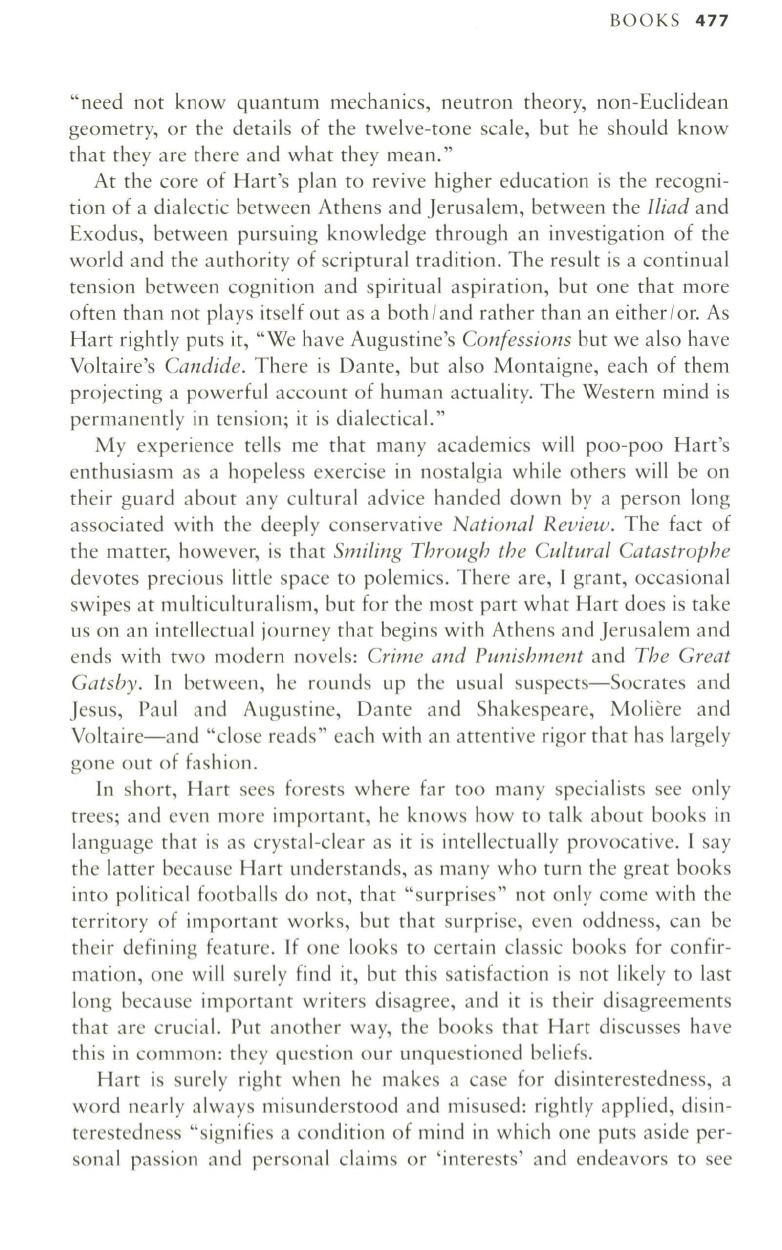
BOOKS
477
"need not know quantum mechanics, neutron theory, non-Euclidean
geometry, or the details of the twelve-tone scale, but he should know
that they are there and what they mean."
At the core of Hart's plan to revive higher education is the recogni–
tion of a dialectic between Athens and Jerusalem, between the
Iliad
and
Exodus, between pursuing knowledge through an investigation of the
world and the authority of scriptural tradition. The result is a continual
tension between cognition and spiritual aspiration, but one that more
often than not plays itself out as a both /and rather than an either /or. As
Hart rightly puts it, "We have Augustine's
Confessions
but we also have
Voltaire's
Candide.
There is Dante, but also Montaigne, each of them
projecting a powerful account of human actuality. The Western mind is
permanently in tension; it is dialectical."
My experience tells me that many academics will poo-poo Hart's
enthusiasm as a hopeless exercise in nostalgia while others will be on
their guard about any cultural advice handed down by a person long
associated with the deeply conservative
National Review.
The fact of
the matter, however, is that
Smiling Through the Cultural Catastrophe
devotes precious little space to polemics. There are, I grant, occasional
swipes at multiculturalism, but for the most part what Hart does is take
us on an intellectual journey that begins with Athens and Jerusalem and
ends with two modern novels:
Crime and Punishment
and
The Great
Gatsby.
In between, he rounds up the usual suspects-Socrates and
Jesus, Paul and Augustine, Dante and Shakespeare, Moliere and
Voltaire-and "close reads" each with an attentive rigor that has largely
gone out of fashion.
In short, Hart sees forests where far too many specialists see only
trees; and even more important, he knows how to talk about books in
language that is as crystal-clear as it is intellectually provocative. I say
the latter because Hart understands, as many who turn the great books
into political footballs do not, that "surprises" not only come with the
territory of important works, but that surprise, even oddness, can be
their defining feature.
If
one looks to certain classic books for confir–
mation, one will surely find it, but this satisfaction is not likely to last
long because important writers disagree, and it is their disagreements
that are crucial. Put another way, the books that Hart discusses have
this in common: they question our unquestioned beliefs.
Hart is surely right when he makes a case for disinterestedness, a
word nearly always misunderstood and misused: rightly applied, disin–
terestedness "signifies a condition of mind in which one puts aside per–
sonal passion and personal claims or 'interests' and endeavors to see


